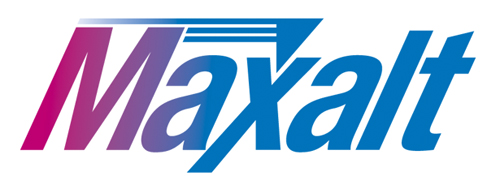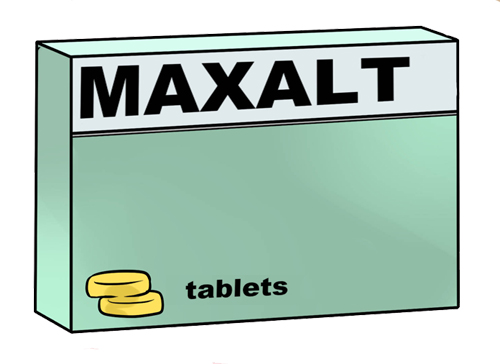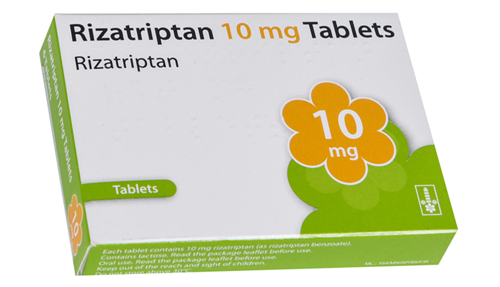

Maxalt (Rizatriptan)
| Drug Name: | Maxalt (Rizatriptan) |
| Dosage: | 5mg, 10mg |
| Best Price: | $4.00 |
| Best place to Buy Maxalt online | Visit GetWellSafely |
Maxalt is a powerful prescription medicine that offers proven relief from migraine pain. Maxalt does not contain aspirin or caffeine and is not a narcotic. It is a headache medicine that narrows the blood vessels around the brain. Rizatriptan also reduces substances in the body that can trigger headache pain, nausea, sensitivity to light and sound, and other migraine symptoms.
Maxalt is used to treat migraine headaches. Maxalt will only treat a headache that has already begun. It will not prevent headaches or reduce the number of attacks. Maxalt belong to the newest family of drugs for migraines called triptans. These drugs are used to relieve migraine headaches, with or without aura, in adults. Triptans are thought to work by narrowing swollen blood vessels in the brain that, when overdilated, cause migraine pain.
Maxalt do not cure migraines, do not reduce frequency of migraines, and are not recommended for migraines described as basilar or hemiplegic. About 25 percent of patients do not respond to any of the triptans.1 Triptans should only be used after determining that acetaminophen (TYLENOL), or nonsteroidal anti-inflammatory drugs , such as ibuprofen (MOTRIN, ADVIL) fail to work or cannot be taken due to allergies. Rizatriptan (MAXALT, MAXALT MLT, RIZALIV, RIZALT) acts quickly, but migraines may recur not long after.

Has a generic version of Maxalt been approved?
The following FDA approved products are equivalent to Maxalt: rizatriptan benzoate tablet. Note: Trusted online pharmacies sell the legal generic version of Maxalt. These medications are safe. If you purchase medications online, be sure you are buying from a reputable and valid online pharmacy. Maxalt is a prescription medicine that belongs to a class of medicines called Triptans.
What kind of pain Maxalt treat
Maxalt is a medicine that is primarily prescribed in order to relieve the migraine and its general symptoms. This drug should not be used to treat other types of severe headaches. However, this medicine might also serve some other purposes. Maxalt is a popular medicine that is known to effectively decrease the widening of the patient's blood vessels. A treatment with this drug is able to returning the widening of the patient's blood vessels to their regular, healthy size. A treatment with this medicine is able to achieve its goal during a migraine, by effectively obstructing the release of several chemicals from the patient's nerve endings (chemicals that are known to usually other migraine symptoms and even more pain).
- Maxalt is a second-generation triptan available in tablet or orally disintegrating tablet formulations that offers several advantages over other members of its class. Maxalt is rapidly absorbed from the gastrointestinal tract and achieves maximum plasma concentrations more quickly than other triptans, providing rapid pain relief.
- Clinical trials have shown that Maxalt is at least as effective or superior to other oral migraine-specific agents in the acute treatment of migraine, and has more consistent long-term efficacy across multiple migraine attacks.
- Maxalt has a favorable tolerability profile, and patients have reported greater satisfaction and a preference for Maxalt over other migraine-specific agents. Improvements in quality of life reported with Maxalt are consistent with its favorable efficacy and tolerability profiles.
Migraine is a common, disabling disorder

Results of a large population-based study performed in the US suggest that migraine affects approximately 20% of women and 8% of men, of whom most experience at least 3-4 severe headache per month. Migraine without aura is the commonest clinical subtype of migraine, and has a higher attack frequency and is generally more disabling than migraine with aura. Migraine without aura is defined as a recurrent disorder that involves headache attacks lasting 3 hours to 2 days, with at least of the following characteristics: unilateral pain, pulsating quality, aggravation on movement, and pain of moderate or severe intensity, also nausea and vomiting. Migraine places a considerable burden on the sufferer, their friends and family, and society, in terms of economic costs and quality of life. Nonsteroidal anti-inflammatory agents, nonopiate analgesics, and combination analgesics may be appropriate for some patients with mild-to-moderate migraine. Patients with moderate-to-severe symptoms or those who respond poorly to adequate doses of analgesics generally require migraine-specific agents or more potent nonspecific analgesics. The results of several studies indicate that migraine affects quality of life during and immediately after a migraine attack, as well as reducing quality of life between episodes. Thus, migraine remains a major healthcare problem, and there is significant opportunity to improve the treatment and management of this condition.
Maxalt effectiveness

The goals of Maxalt migraine management are to treat attacks rapidly and consistently without recurrence, restore the patient's ability to function, minimize the use of rescue medications, optimize self-care and subsequent resource use, be cost effective, and have minimal or no adverse events. Patients report greater satisfaction with migraine-specific Maxalt therapy than with analgesics, nonsteroidal anti-inflammatory drugs. In a survey of US primary care physicians, rapid achievement of pain-free and sustained pain-free status were considered the most important efficacy attributes of Maxalt treatment.
The potential economic benefits of rizatriptan therapy may also be taken into account when selecting from among the oral triptans. A recent analysis determined that substantial productivity costs of migraine to the US employer could be significantly reduced if rizatriptan were used instead of patients' existing therapies. Moreover, a USA cost-effectiveness analysis performed from a societal perspective showed that rizatriptan was more cost-effective in the treatment of acute migraine, reflecting both reduced costs and greater effectiveness.
Dosing information
Use Maxalt at onset of a migraine, with or without aura. Do not take for a headache different from your usual migraines; instead, check with your doctor.
Usual Adults Dose for Migraine:
The recommended starting dose of MAXALT is either 5 mg or 10 mg for the acute treatment of migraines in adults. The 10-mg dose may provide a greater effect than the 5-mg dose, but may have a greater risk of adverse reactions.
Usual Pediatric Dose for Migraine:
Dosing in pediatric patients is based on the patient's body weight. The recommended dose of MAXALT is 5 mg in patients weighing less than 40 kg, and 10 mg in patients weighing 40 kg or more.
For 6 years or older and weight less than 40 kg: Initial dose: 5 mg orally once.
For 6 years or older and weight 40 kg or greater: Initial dose: 10 mg orally once.
Maximum Adult Dose:
For adults, the US manufacturer recommends a maximum dose of 30 milligrams in a 24-hour period. The Canadian manufacturer recommends a maximum dose of 20 milligrams in a 24-hour period.
For regular, oral tablets, swallow dose with a glass of water. If tablets are scored, these may be cut in half. Do not crush or chew tablets. Eating food may delay relief from sumatriptan up to 30 minutes. For oral disintegrating tablets, use dry, clean hands to peel back the foil of blister-pack. Place tablet on the tongue, where it dissolves rapidly. Do not eat, drink, smoke, or chew tobacco while this tablet dissolves. Do not remove disintegrating tablets from blister-pack prior to time needed. Maxalt may be taken with or without food, but may work faster when it is taken on an empty stomach. The dosage is based on your medical condition, age, response to treatment, and other drugs you may be taking. If there is no improvement in your symptoms, do not take more doses of this medication before talking to your doctor.

Overdosage
No overdoses of Maxalt were reported during clinical trials in adults. Some adult patients who received 40 mg of Maxalt either a single dose or as two doses with a 2-hour interdose interval had dizziness and somnolence.
After taking your prescribed dose, lie down in a quiet, dark space if possible. Ice packs or massage on your forehead or temples may help alleviate pain. If you get no relief, do not take another dose. If you get partial relief, or symptoms return after two hours, you may repeat an additional dose.
Precautions
If you have risks for heart disease (such as diabetes, high blood pressure, high cholesterol, overweight, smoking, or family history of heart disease), it is advisable to take your first dose under medical supervision. Maxalt should not be used to treat a common tension headache, a headache that causes loss of movement on one side of your body, or any headache that seems to be different from your usual migraine headaches. Use this medicine only if your condition has been confirmed by a doctor as migraine headaches. Until you know how you react to this drug, do not drive or perform other activities requiring mental alertness. Avoid alcohol, which aggravates headaches. Avoid smoking. FDA issued an advisory that overuse of actue migraine drugs, including triptans, may lead to an exacerbation of headache known as medication overuse headache (MOH). Patients using these drugs for migraine headaches should be aware of MOH and are advised to keep records of headache frequency.
Common side effects
Side effects of Maxalt include tingling, numbness, tightness in the chest and neck, and a sensation of warmth. Twenty percent of patients treated with Maxalt experience these chest symptoms. Other common side effects include dizziness, dry mouth, fatigue, nausea and skeletal pain. Generally, higher doses lead to more adverse effects.
Benefits
Maxalt is generally well tolerated, with an overall incidence of adverse events and quality of life benefits similar to other triptans. It is associated with a higher degree of patient satisfaction than other migraine-specific agents, with rapid pain relief, ease of use (wafer formulation), and tolerability being important reasons for patient preference. Multi-attribute decision models incorporating efficacy data and weighted clinical attributes identify rizatriptan as one of three triptans closest to a hypothetical ideal. In conclusion, rizatriptan is a well-established, effective, and well-tolerated agent for the acute treatment of migraine.
Maxalt reaches maximum plasma concentrations quickly, with a shorter time than other available triptans, and produces rapid onset of pain relief. This may prove advantageous in the early treatment of migraine, allowing rapid relief of mild pain before an attack becomes moderate to severe.
Most common Maxalt benefits based on patient preference, tolerability, efficacy.
- Generally well tolerated
- Provides more rapid pain relief than other migraine-specific agents
- Consistent efficacy over 6–12 months
- More consistent intra-patient efficacy than other triptans
- Effective in menstrually associated migraine
- Effective for mild pain of early migraine attack
- Some evidence of efficacy in adolescents
- Higher degree of patient satisfaction than other migraine specific agents
- Important reasons for patient preference include rapid pain relief, ease of use, and tolerability
Potential economic benefits.
- Advantageous cost-effective ratio vs other triptans
The quality of life benefits afforded by Maxalt, as mentioned above, are consistent with the favorable efficacy and tolerability profile of the agent.
The cost of Maxalt treatment
The cost for triptan treatment depends on how often you have to take one, since they're taken only when a migraine occurs. Frequent use of brand Maxalt can be expensive. Rizatriptan is an expensive drug used to treat migraines with or without aura. It is available in generic and brand versions. The availability of OTC Maxalt is a logical development for the better management of a common, benign, self-limiting but nonetheless burdensome disorder that is currently grossly undertreated. This is good development, but recognise that advice at the point of sale is crucial for effective and safe use of these drugs. How much does generic Maxalt cost? The cost for Maxalt oral tablet 5 mg is around $700 for a supply of 18 tablets, depending on the pharmacy you visit. Prices are for cash paying customers only.
How And Where To Buy Maxalt Online?
There are a couple of ways to get Maxalt, one of which is online. You only need to have a consultation with prescribers. No more visits to your local pharmacy or waiting in long lines. Receive genuine medication delivered conveniently and discreetly to your door. The online consultation takes only a few quick seconds, and it's fast, simple, and easy to complete. A short set of questions, similar to those you would be asked at your GP appointment, is included. Independent prescribers will review your consultation immediately. Once approved, the Online Pharmacy medical team will recommend a treatment and issue a free prescription. All orders are dispatched on the same day in discreet packaging, with regular notifications to keep you informed every step of the way until your order is received.
The online pharmacy which have a good reputation would be the right choice for buying this medicine. Buying Maxalt online is not only cheaper, it's also less of a hassle, as the drug is delivered to your home. It's however important to note that you should buy generic Maxalt only from verified online pharmacies.
Availability of Maxalt without a prescription will inevitably result in easier access to these medications, which, in turn, may result in improved treatment and lower migraine-related disability.
However, this increased accessibility must be balanced with appropriate patient education and safety measures. Patients should be informed about the correct usage, potential side effects, and contraindications of Maxalt to ensure its safe and effective use. Furthermore, self-medication should be approached with caution, especially for individuals with pre-existing health conditions or those taking other medications. Ultimately, while over-the-counter availability of Maxalt can significantly benefit those suffering from migraines, it underscores the importance of responsible use and the need for ongoing public health education.